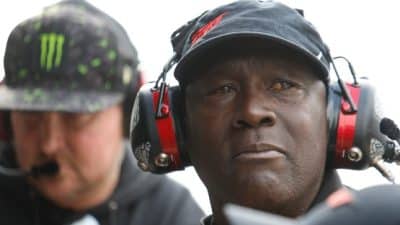
The final report from the investigation into the culture and practices at Virginia Military Institute is in, and it’s damning.
“VMI must acknowledge that racial and gender disparities exist and that improvement is needed,” begins the executive summary to the report, released today by the State Council of Higher Education for Virginia, and prepared by Barnes & Thornburg.
The investigation, ordered by Gov. Ralph Northam and legislative leaders in October 2020, began in January, and included interviews with current cadets, faculty and staff, administration and alums.
The jaw-dropping conclusion:
“The Virginia Military Institute, founded in 1839, is a historically important institution that has produced generations of respected citizen soldiers and leaders. VMI has also traditionally been run by white men, for white men,” the executive summary of the report offers. “VMI’s overall unwillingness to change – or even question its practices and traditions in a meaningful way – has sustained systems that disadvantage minority and female cadets and faculty, and has left VMI trailing behind its peer institutions.
“If VMI refuses to think critically about its past and present, and to confront how racial and ethnic minorities and women experience VMI, it will remain a school for white men.”
The release of the report elicited a joint statement from Northam, a VMI alum, along with Lt. Gov. Justin Fairfax, Attorney General Mark Herring, Speaker of the House Eileen Filler-Corn, Senate President pro tempore Louise Lucas, Chair of the Legislative Black Caucus Lamont Bagby, Chair of the House Appropriations Committee Luke Torian, Senate Majority Leader Dick Saslaw, House Majority Leader Charniele Herring, and Senate Democratic Caucus Chair Mamie Locke.
“Today, the Commonwealth and VMI received the highly detailed report examining the culture at the oldest state-supported military college in the United States.
“The investigation found that institutional racism and sexism are present, tolerated, and too often left unaddressed.
“While VMI has taken incremental steps forward since this review began, much more is needed. The question is whether VMI is willing to acknowledge this reality.
“The Commonwealth will study this report carefully and then take appropriate action. VMI would be wise to do so as well. VMI is an agency of state government, and we will hold it accountable.”
More from the report
- “Perceptions about the racial climate at VMI are often dependent on the respondent’s race or ethnicity. According to survey results of current cadets, half of African American cadets strongly or somewhat agree that there is a culture of racial intolerance at VMI, while only 10% of Caucasian cadets agree with that sentiment. Similarly, 42% of African American cadets responded that African Americans are discriminated against ‘a lot’ at VMI, compared to only 4% of Caucasian cadets who feel that way. Half of African American cadets strongly or somewhat agree that it is harder for people of color to succeed at VMI, compared to 5% of Caucasian cadets who feel that way. The interviews reflected a similar dynamic. More than one Caucasian survey respondent insisted that the real racial issue at VMI is racism against whites. These responses and perceptions paint a picture of a VMI where African Americans experience racism but Caucasian cadets do not or choose not to see it. Other minority respondents did not report experiencing racism at the same level as African American respondents.”
- “One of the most common opinions among investigation participants, especially Caucasian ones, is that there is not a race problem, but a problem with a divide between athletes and non-athletes. The investigation found that a significant rift does indeed exist between athlete and non-athlete cadets. Both athletes and non-athletes feel the rift. They stated that non-athletes tend to resent athletes because they are given what is perceived as preferential treatment. Athletes, in turn, take offense to this resentment and feel that non-athletes minimize their sacrifices, hard work, and contributions as NCAA athletes. The investigation found that this divide breeds racial resentment due to the incorrect perception that ‘athlete’ means ‘African American’ when in reality only 18% of athletes are African American. Even on the football and basketball teams, which some respondents described as ‘black’ teams, African American cadets are in the minority. Reliance on the misperception that VMI ‘does not have a race problem, it has an athlete problem’ allows the Institute to avoid addressing the underlying association between athletics and race and the issue of race in general.”
- “The review of the Honor Court and Honor Code found that most Honor Court cases, when examined in isolation, involve fair proceedings, follow documented procedures, and produce defensible results. However, analysis of the 91 cases that resulted in a conviction in the last 10 years shows that while cadets of color represent 23% of the corps of cadets, they make up 41% of dismissed cadets since 2011. The racial disparity exists regardless of whether the cadet is an athlete. Elimination of the fundamental elements of the Honor Code or Honor Court is not recommended. However, it is recommended that the Superintendent’s plans to examine the Honor Court system should include a root-cause analysis of these statistics, revisions to training and procedures to implement more equitable processes, and improvement in the documentation and monitoring of statistics to better identify disparities.”
- “Cadets, alumni, and faculty repeatedly described the culture at VMI as one of silence, fear, and intimidation, especially as it relates to the reporting of problems or issues that reflect negatively on the Institute or its leadership. Interviewees reported that, in some sexual assault cases, members of the VMI administration have actively dissuaded victims from making reports. Interview respondents also explained that they perceived or experienced that VMI leadership puts a high priority on suppressing information and avoiding difficult situations, and less of a priority on addressing underlying problems. The Team had the same experience. VMI has taken affirmative steps to prevent negative information from making it into this report. Just one example of this was when VMI attempted to, and in some cases did, put VMI attorneys in rooms with interviewees under the guise of legal representation, knowing that the attorneys’ presence would chill or limit the candor of the interviewee. VMI also withheld requested information, dissuaded members of the VMI community from participating in or providing information for this report, and has actively sought to undermine the findings in this report before its release.”
- “VMI maintains an outdated, idealized reverence for the Civil War and the Confederacy. While VMI has recently taken steps to address this, many VMI traditions relating to the Civil War era are still given disproportionate attention. Some members of the VMI community still advocate for celebrating Confederate traditions (noting that it is a part of history that should not be ‘erased’) without appreciating or accepting that it offends many African Americans, whether or not they are members of the VMI community. In contrast, minority members of the VMI community are at times not afforded the same opportunities to celebrate holidays and dates significant to their community, and there is almost no representation of other military or civil rights iconography on post.
- “On gender, many respondents – including men – stated that VMI’s gender-equity issues are worse than its racial-equity issues. Respondents reported incidents of gender inequity; a culture of not taking women seriously; doublestandards for women on matters of dress, social behavior, and sexual behavior; and disturbing sexist and misogynistic comments on social media apps such as Jodel. Some men reported resentment toward women for perceived preferential treatment in physical training standards, Rat Line experience, discipline, and leadership opportunities. Female respondents had varying views about whether women are discriminated against at VMI. Many women expressed pride in VMI and the treatment of women by male cadets and a desire not to be given any preferential treatment simply because they are women.”
- “Sexual assault is prevalent at VMI yet it is inadequately addressed by the Institute. In the survey, 14% of female cadets reported being sexually assaulted at VMI, while 63% said that a fellow cadet had told them that he/she was a victim of sexual assault while a VMI cadet. Many female cadets reported a consistent fear of assault or harassment by their fellow male cadets. These fears are exacerbated by some procedures at VMI, including the inability to lock their doors. Many female cadets also feel that assault complaints are not or will not be taken seriously by the VMI administration or that a cadet will suffer retaliatory consequences for reporting them. Indeed, a Virginia statute makes it illegal for a university to punish a student for a drug or alcohol offense that comes to light during a report of sexual assault. The statute applies to every institution in the Commonwealth, with one notable exception: VMI. Although VMI conducts extensive sexual assault training on post, female cadets report that male cadets treat it as a joke and an opportunity for misogynistic humor, without consequence. Cadets perceive that the VMI-provided training is often not respected or taken seriously.”
- “The picture of race at VMI that has emerged from this investigation is complex. Many alumni and current cadets (most but not all Caucasian) have reported that they never observed or experienced any instances of racial intolerance during their time at the Institute. On the other hand, a number of alumni and current cadets (especially African Americans) have reported that they did experience racial discrimination or intolerance at VMI and that it was fueled or aggravated by VMI’s culture. Yet, members of the VMI community who did not experience or observe racism or sexism at VMI (even if they believe those who did) often do not comprehend that VMI’s own history, traditions, and unwillingness to change foster a racist culture at VMI. This culture impedes VMI’s ability to recruit cadets and faculty from underrepresented populations. VMI’s delay in addressing its Confederate symbolism and past, its delay in undertaking DEI initiatives, and the continued, loud resistance to reform efforts among many in the VMI community are a sign to African Americans that they are not valued or wanted at VMI. VMI has responded in the past that ‘these problems exist everywhere’ and ‘we are no worse than any other school.’ Those statements are inconsistent with VMI’s motto of “don’t do ordinary” and are detrimental to VMI.”
Story by Chris Graham










